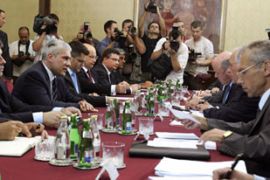Serbia urges poll boycott in Kosovo
The next round of Kosovo status talks is scheduled to be held in London next week.

An international troika composed of US, EU and Russian envoys launched the negotiations following the UN Security Council’s failure to agree on a plan that envisages Kosovo’s “supervised independence”.
Ethnic Albanians insist on independence, but Serbia is only prepared to offer broad autonomy and has won the support of Russia, which rejected a series of proposed resolutions before the security council earlier this year.
Belgrade opposition
Belgrade justified its opposition to the Serbs’ involvement in the polls by referring to the difficult conditions in which they live – particularly those in isolated enclaves protected by Nato peacekeepers.
|
“The government of Serbia considers that even eight years after the UN mission was introduced in Kosovo, elementary conditions have not been met for the safe and free life of Serbs and other non-Albanians” Serbian government statement |
“The government of Serbia considers that even eight years after the UN mission was introduced in Kosovo, elementary conditions have not been met for the safe and free life of Serbs and other non-Albanians,” the government statement said.
“It is especially disastrous that two-thirds of Kosovo Serbs still live as refugees and are not able to return to their homes,” it said.
Though still a Serbian province, Kosovo has been under UN administration since its 1998-1999 war, when Nato bombing ended a crackdown by forces backed by Belgrade against ethnic Albanian separatists.
More than 200,000 Serbs and other non-Albanians have since fled the province bordering Albania and Macedonia.
Serbs snub elections
The boycott announcement is second in succession after the previous Belgrade government, also led by Vojislav Kostunica, the prime minister, encouraged Serbs to snub elections in October 2004.
At the time, less than one per cent of 150,000 eligible Serb voters, including more than 100,000 refugees living outside of Kosovo, cast their ballots.
However, earlier on Thursday, the electoral commission in the provincial capital Pristina said that Serbs made up eight out of 64 candidates on lists submitted ahead of a deadline on Wednesday .
Following the vote, the 120-seat parliament is to elect a new president and prime minister.
In its statement, the Serbian government said it would continue talks with Tadic on their position regarding municipal elections in Kosovo scheduled for the same date.
The next round of the Kosovo status talks is scheduled to be held in London next week.